How can I track and why should I care what ChatGPT says about my brand in 2026?
You can track what ChatGPT says about your brand using specialized AI brand monitoring tools that analyze AI-generated responses across different platforms (leading solutions: Superlines, Profound, Peec AI, Promptwatch). And you should care about this because millions of people now use AI chatbots for product research and recommendations see the latest numbers in ChatGPT Statistics 2026 by Superlines, making AI mentions as important as traditional search rankings for your brand's visibility and reputation.
This article will walk you through tracking methods, explain why monitoring matters, and provide actionable steps and solutions to improve your AI visibility.
Why should I care about what AI chatbots say about my brand?
AI chatbots are fundamentally changing how consumers discover and research brands. According to the latest ChatGPT statistics for 2025, millions of people are using AI platforms daily for everything from product recommendations to problem-solving.
The creates several critical concerns for brands:
• Visibility gaps: If your brand isn't mentioned in AI responses, you're invisible to a growing segment of potential customers
• Misinformation risks: AI chatbots might share outdated or incorrect information about your company
• Competitive disadvantage: Competitors mentioned in AI responses gain significant exposure while you remain unseen
• Reputation management: Negative or inaccurate brand representations can spread without your knowledge
How do AI chatbots like ChatGPT decide what to say about brands?
AI chatbots generate brand mentions based on complex algorithms that analyze training data, recent information, and conversation context. Understanding this process helps you optimize your AI visibility.
Key factors influencing AI brand mentions include:
- Training data quality: Information available during the AI's training period
- Source authority: How credible and frequently cited your brand's content is
- Recency and relevance: How current and contextually appropriate your information appears
- User query specifics: The exact phrasing and context of user questions
- Competitive landscape: How your brand compares to alternatives in the AI's knowledge base
To compensate for gaps in their knowledge and deliver accurate, time-sensitive information, AI chat systems often use a technique known as query fan-out. In this approach, the language model breaks a user’s prompt into multiple targeted search queries to retrieve real-time information from indexed online sources. For example, ChatGPT uses Bing’s search indexing to power its real-time browsing and research capabilities.
AI responses are dynamic and can vary significantly based on conversation context and recent updates. This variability makes consistent monitoring important for understanding how your brand is represented across different scenarios.
Why tools that use only APIs can miss real AI answers
One of the biggest technical differences between Promptwatch alternatives is how they collect answer data. Some tools rely only on model APIs, while others capture the real answers that users actually see in the UI. This matters a lot for Brand Visibility and Citation Rate.
What tools can I use to track ChatGPT brand mentions?
Several specialized tools have emerged to help businesses monitor their presence in AI-generated content. These platforms offer different approaches to tracking and analyzing brand mentions. Below are the leading options for tracking how often (and how well) your brand shows up across AI answers. Start with Superlines if you want an end-to-end view of “AI Search share of voice,” then consider the others based on your stack and needs.
1. Superlines
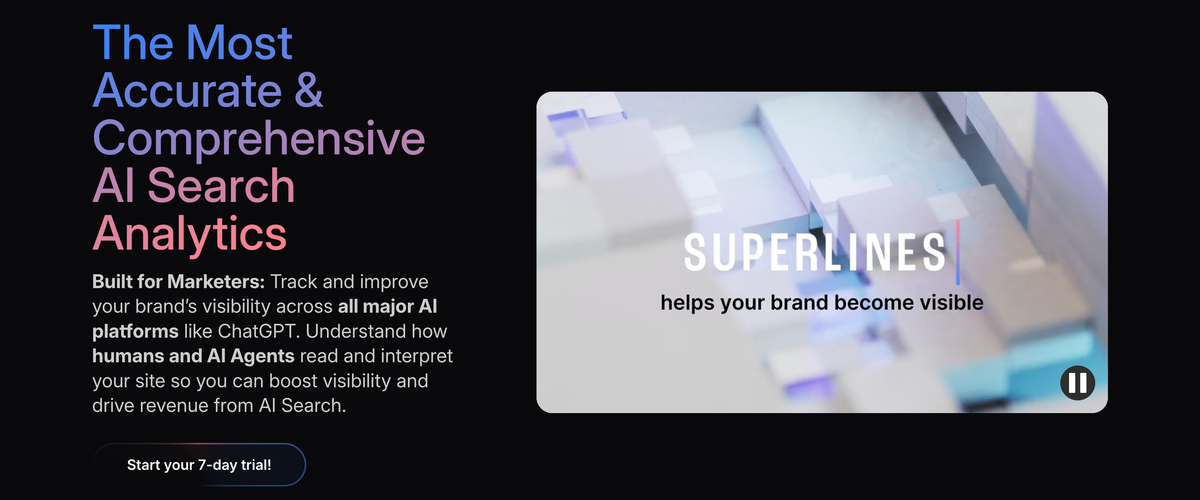
Superlines is an AI search analytics (GEO) platform that helps marketing teams and agencies see how often AI engines mention and cite their brand, then turns that visibility data into clear opportunities instead of static dashboards. It uses real answer data from live AI interfaces across 10 major AI engines and exposes the same structured dataset through an MCP server so teams can work with the data inside their own AI assistants and agents when they want to go deeper.
Key features
- Cross platform AI visibility tracking: Track brand visibility and competitive share of voice across 10 major AI engines, including ChatGPT, Perplexity, Claude, Microsoft Copilot, Google AI Mode, Google AI Overviews, Gemini, Mistral, DeepSeek and Grok.
- Citation and competitor gap analysis: See which pages are cited, where competitors win citations instead of you, and which third party articles or UGC threads (for example Reddit, Quora) are worth pursuing for additional mentions.
- AI Traffic and AI Bot Analytics: Monitor how AI crawlers from OpenAI, Anthropic, Google, Perplexity and others actually visit your site, which pages they read, and how that traffic connects to human visits at prompt and URL level.
- Automated prompt management and Search Query Fan-Out insights: Superlines helps you discover, test and clean up prompts, and surfaces the Search Query Fan-Outs (LLM keywords) that AI assistants run behind the scenes so you see which topics, queries and sources drive your AI visibility.
- Built for multi brand, multi market workflows: Unlimited brands and domains per workspace, with market specific languages and competitors. Designed for agencies and in house teams that manage several services and regions in one view.
- Agentic ready data layer via MCP server: Enterprise and agency users can access the full visibility dataset through an MCP server so their own AI assistants can analyse results, suggest next steps and support day to day GEO workflows.
Pricing
- Starter plans from €89 per month, including 1 AI engine of your choice, 75 tracked prompts, AI Traffic plus AI Bot analytics, and MCP access.
- Higher tiers add more engines, prompts, data retention and advanced tools like large scale crawling and content support.
Limitations
- Tiered Feature Access: Advanced tools like full historical data are reserved for Enterprise and Agency partnership plans.
- Data Limits: Entry-level plans have more restrictive data retention and prompt volumes.
2. Profound
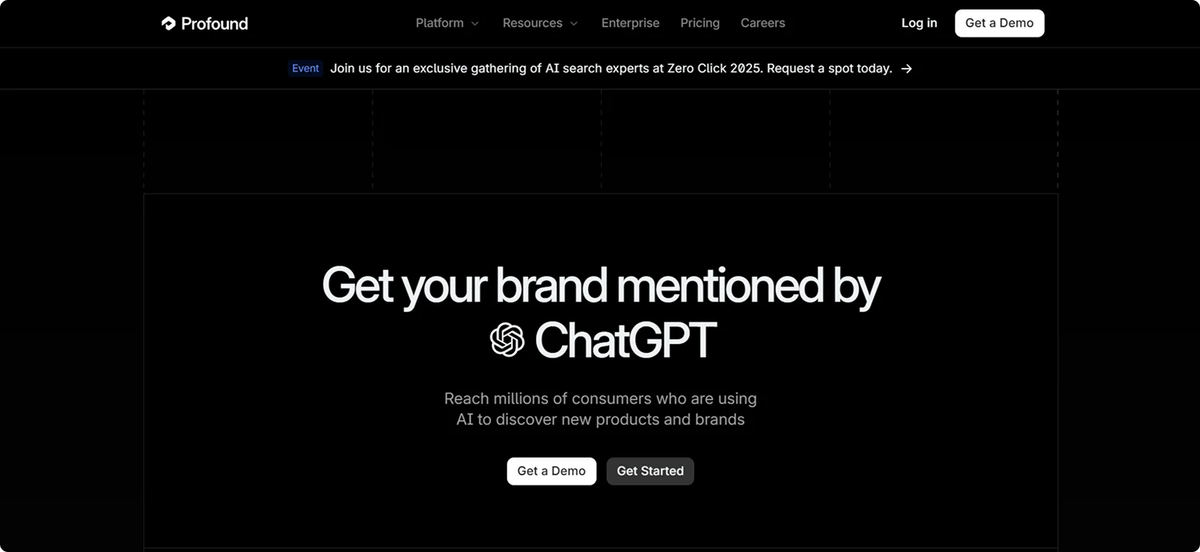
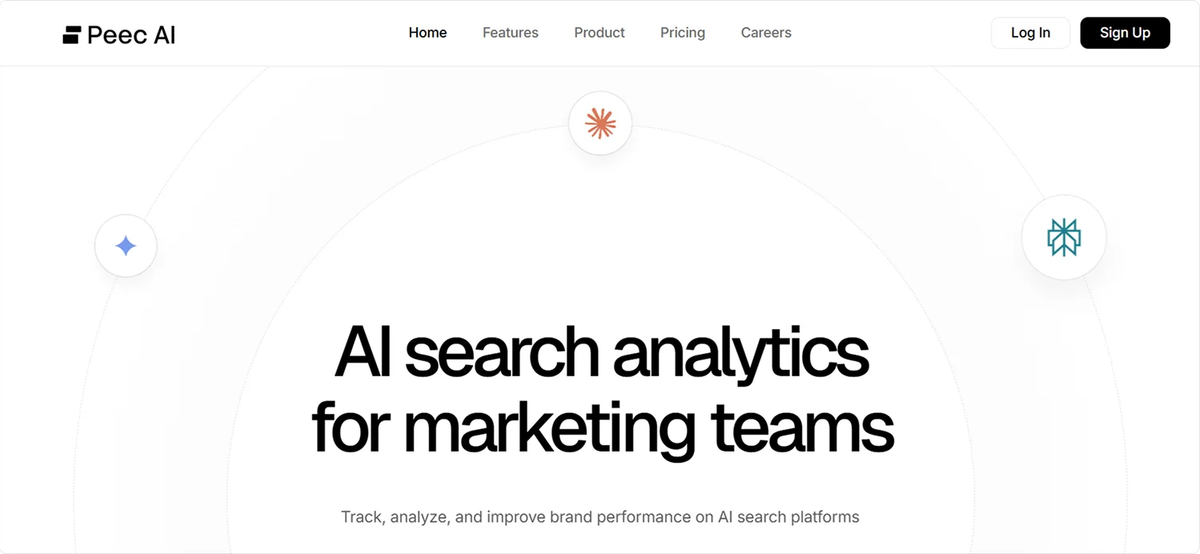
Profound has evolved from a promising GEO platform to a market-defining company pioneering the concept of "marketing to Superintelligence." Its $35M Series B funding (right after their $20M Series A in June of 2025), led by Sequoia Capital, positions it as the definitive solution for organizations serious about preparing for an AI-first marketing future.
Key Features:
- Answer Engine Insights: Comprehensive brand visibility tracking across ChatGPT, Perplexity, Gemini, and other major AI platforms.
- AI Crawler Analytics: Agent Analytics reveals how AI crawlers access your content, provides a technical analysis to ensure your site is optimized for AI indexing, and uses a GA4 integration to attribute traffic and conversions to AI search.
- Shopping Intelligence: Shopping Insights shows your products' visibility in ChatGPT identifies keywords to target, analyzes competing products and retailers, and helps you refine how your products are represented.
- Conversation Explorer: Live monitoring of trending topics and user query patterns across AI platforms.
- Content Workflows: Automated content creation and optimization pipelines for AI visibility.
Pricing: Starting at $89/month for the Standard plan, with custom enterprise pricing available.
Limitations:
- Many advanced features, such as Agent Analytics, Shopping Insights and full multi engine coverage, are locked to higher tier plans.
- As a bigger, enterprise focused platform, it usually requires more setup and is slower to adapt than some of the newer GEO solutions.
- Public information about the external datasets they “buy” to power their platform is limited, so teams that need full data lineage and methodology transparency will have to ask detailed questions during procurement.
If you’re comparing enterprise GEO solutions, check out our Best Profound Alternatives 2026 guide for a full breakdown of competing platforms.
3. Peec AI

Peec AI offers comprehensive multi-platform monitoring with a focus on real-time alerting and competitive benchmarking across AI search engines.
Key Features:
- Real-Time Alerts: Instant notifications when brand visibility changes for specific prompts
- Multi-Platform Coverage: Tracking across ChatGPT, Perplexity, Gemini, and emerging AI platforms
- Source Attribution Analysis: Understanding which websites influence AI responses about your brand
- Regional Tracking: Geographic-specific monitoring for international brands
Pricing: Basic: €89/month (25 prompts), Plus: €199/month (100 prompts), Business: €499/month (300+ prompts)
Limitations
- Limited optimization recommendations compared to competitors. Higher pricing for advanced features.
- Relies on API output instead of capturing real answers from AI interfaces.
4. Scrunch AI
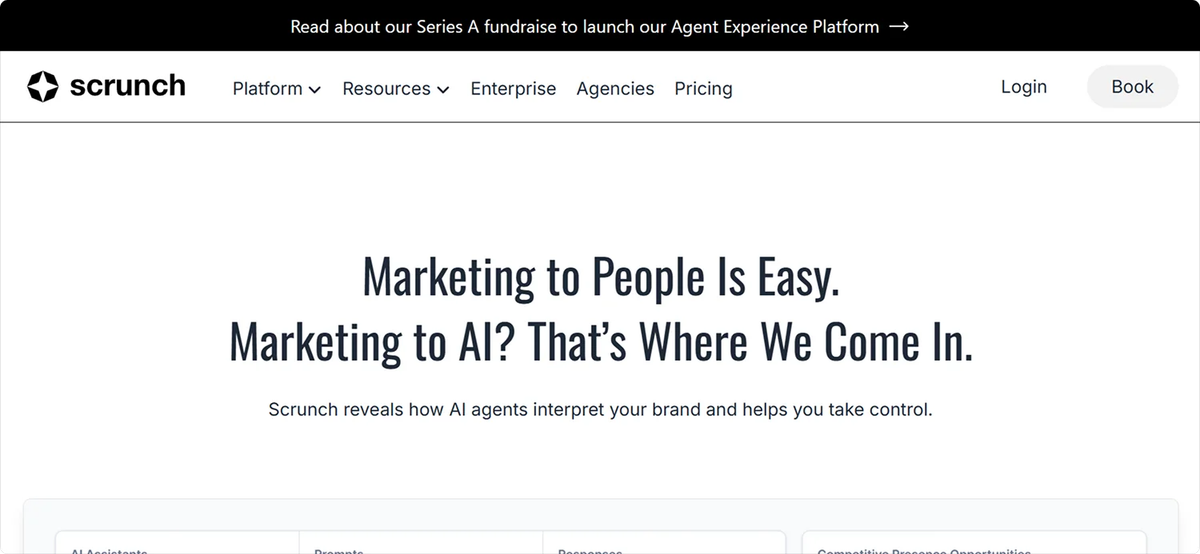
Scrunch is a GEO tool that helps enterprise teams detect and correct false narratives in AI-generated answers. If you're concerned about outdated product information, competitor-biased summaries, or broken messaging, it provides the right solutions for your team.
Key Features:
- Misinformation Detection: Proactive identification of false or outdated brand information in AI responses
- Narrative Control: Tools for correcting and improving brand representation across AI platforms
- Journey Mapping: Understanding how AI agents navigate websites and interact with content
- Knowledge Hub: Library of owned and third-party content that AI engines cite
Pricing: Starter: $300/month (350 prompts), Growth: $500/month (700 prompts), Pro: $1,000/month (1,200 prompts)
Limitations:
Limitations
- Higher pricing for basic features. Limited market presence compared to established platforms.
- Relies on API output instead of capturing real answers from AI interfaces.
- In our tests with established enterprise clients, creating an AI friendly version (AXP feature) on a separate domain did not increase AI bot traffic, largely because that domain lacked authority. The idea is interesting, but so far we have not seen consistent visibility gains in real production use.
5. XFunnel
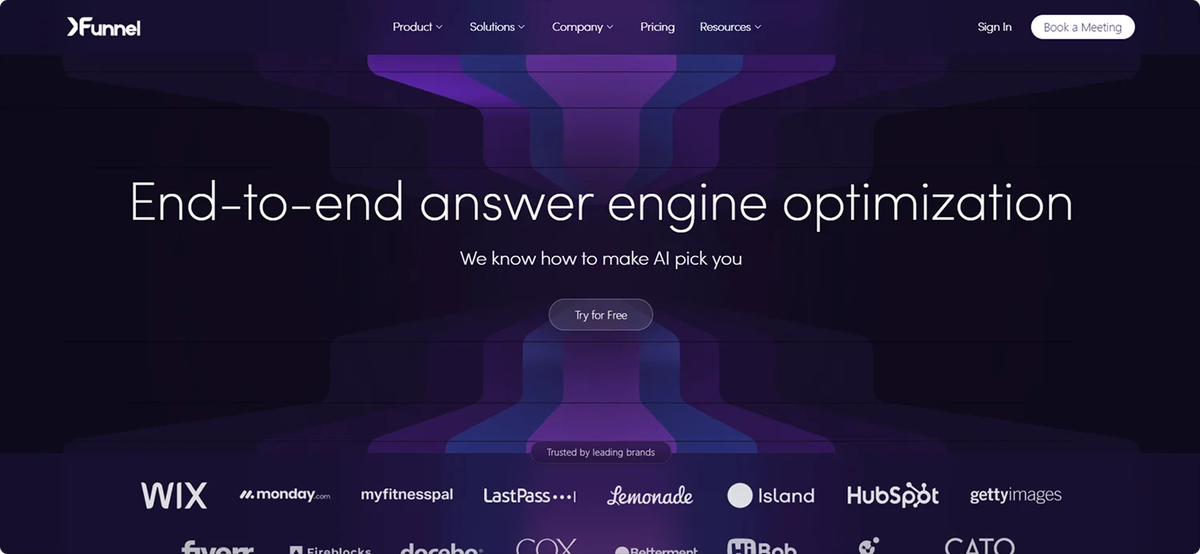
XFunnel combines AI visibility analytics with actionable playbooks and expert support. What makes this tool unique is its "Buying Journey Analysis" dashboard. This GEO analytics feature breaks down your brand's AI visibility at each stage of the funnel, from awareness to consideration to conversion.
Key Features:
- Buying Journey Analysis: Funnel-specific visibility tracking from awareness to conversion
- Query Analytics: Discovery of top AI prompts by intent, region, and persona
- Dedicated Analyst Support: Tailored recommendations and optimization playbooks
- Real-Time Visibility Tracking: Cross-platform monitoring with trend analysis
Pricing: Custom pricing with free AI search audit available.
Limitations:
- Custom pricing lacks transparency. Limited public information about platform capabilities.
- Relies on API output instead of capturing real answers from AI interfaces.
6. Otterly AI
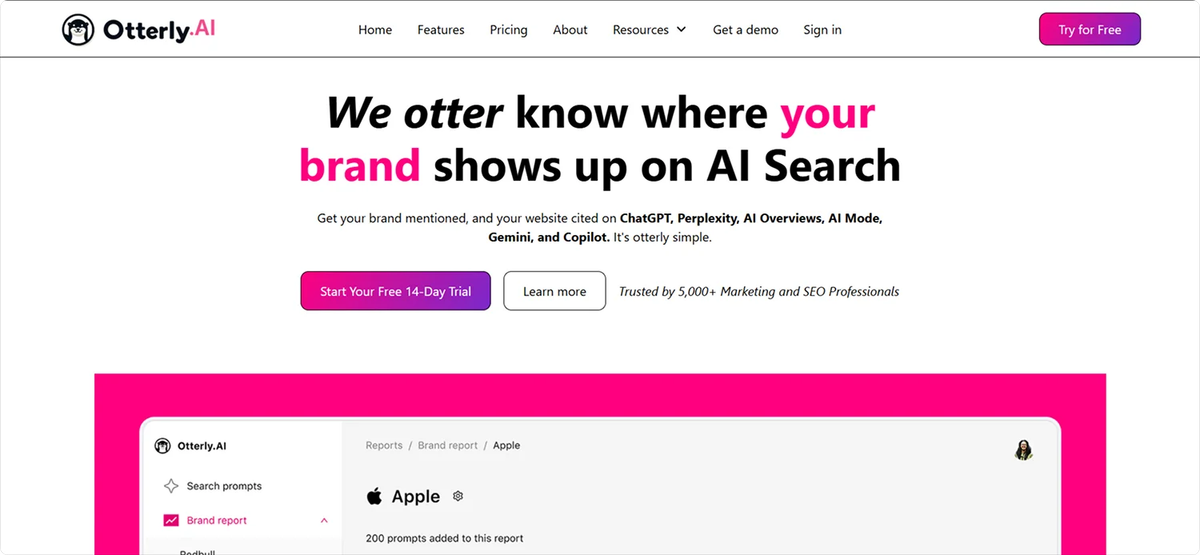
Otterly is the most practical GEO tool for teams focused on prompt-level AI rankings. It lets you monitor where your brand appears in AI-generated responses, track link citations, and discover high impact prompts your audience is using.
Key Features:
- Prompt Discovery: AI keyword research tool that transforms traditional keywords into conversation-based queries
- Automated Link Citation Detection: Real-time tracking when AI platforms reference your content with links
- Brand Visibility Index: KPI showing brand prominence across AI search engines over time
- GEO Audit: Comprehensive analysis with SWOT, competitor assessment, and tactical recommendations
Pricing: Lite: $29/month (10 prompts), Standard: $189/month (100 prompts), Pro: $989/month (1,000 prompts)
Limitations:
- Significant price jump between tiers. The leap from $29 to $189 monthly might be challenging for growing businesses. Limited advanced analytics compared to enterprise platforms.
- Relies on API output instead of capturing real answers from AI interfaces.
7. Promptwatch
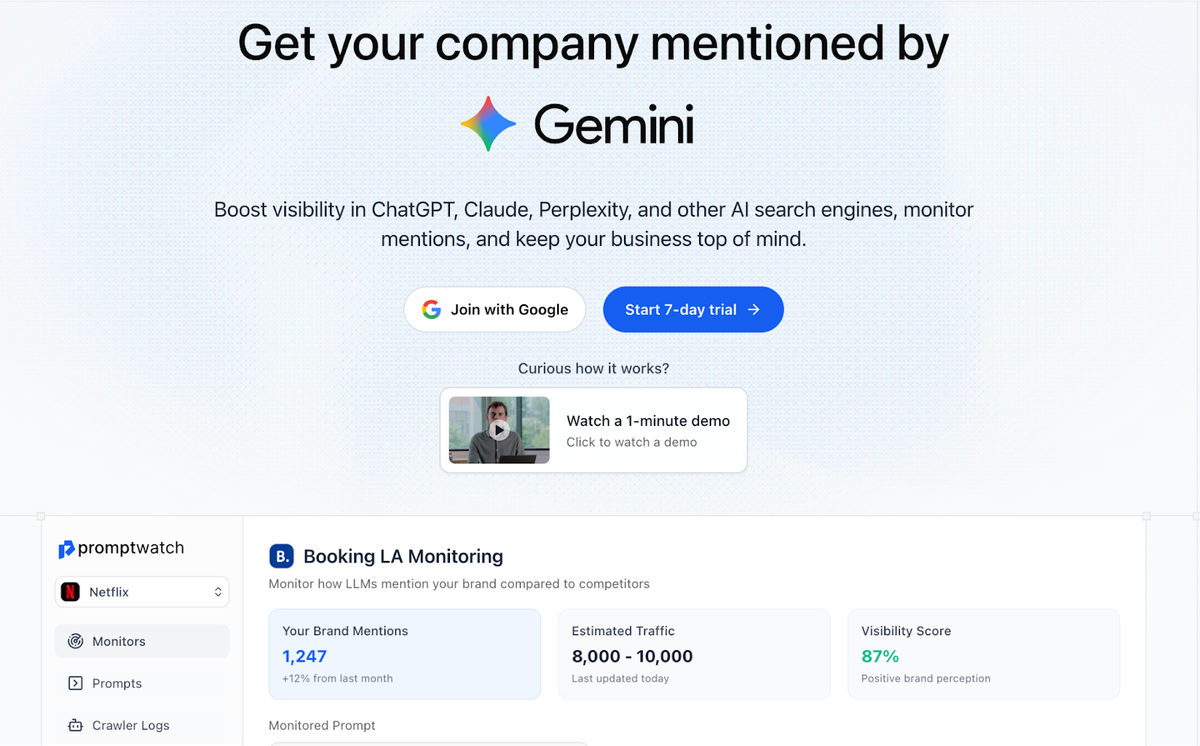
Like the name of the product says, Promptwatch tool helps you track brand mentions across AI platforms, helping companies understand how they're portrayed by AI Search engines.
Key Features:
- Prompt tracking: Track brand mentions across AI models
- AI traffic attribution: Identify which AI models drive traffic and conversions, and tie outcomes back to pages and content.
- Content optimization: Receive content optimization suggestions
- Looker studio integration: Allows you to view your data in Looker studio
Pricing: Starting from $75/a month with Professional and Business options.
Limitations: Platform itself isn’t as actionable as it could be and to get everything out of the platform you are required to have technical implementation skills and required to send server logs for them to attribute traffic.
8. SEOmonitor
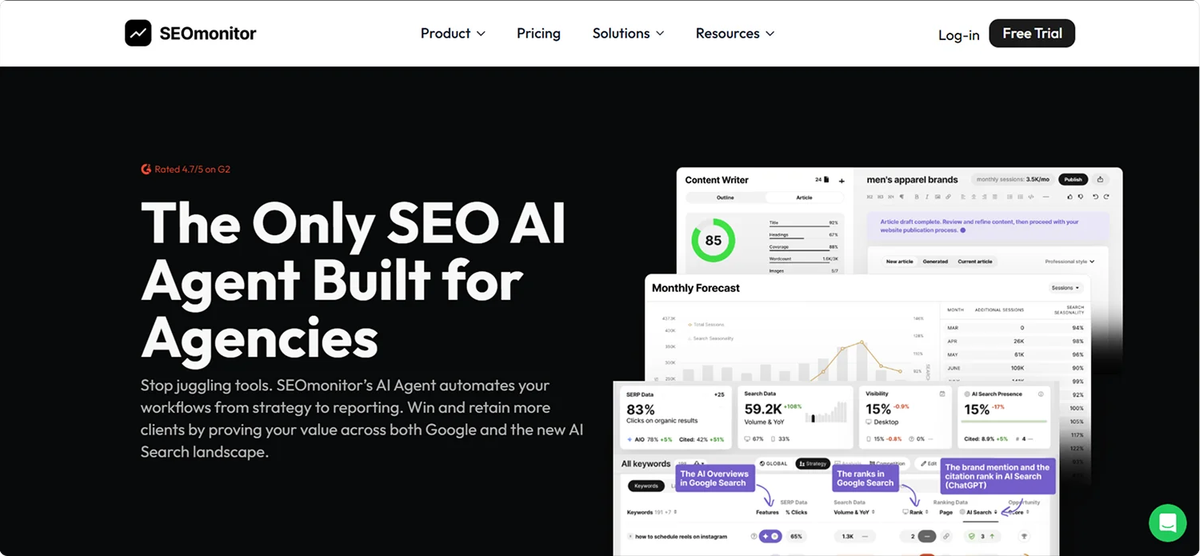
SEOmonitor is an in-depth AI Overviews and chatbot tracking tool with access to brand mentions, daily snapshots, and custom analyses. Plus, the platform allows dual-signal tracking (SEO+GEO).
Key Features:
- Response evolution tracking: You can check when and how your content gets added or left out in chatbot conversations
- Access raw data through API: This feature lets you access raw data to run large-scale reports
- Dual SEO and AI tracking capabilities
Pricing: Starter: From $116 for 1000 keywords tracked daily. Writer: $29 for 5 AI-written articles. Pro: From $339 for 3000 keywords tracked daily.
Limitations:
- Targets only agencies instead of in-house teams as well.
- Relies on API output instead of capturing real answers from AI interfaces.
9. Goodie AI
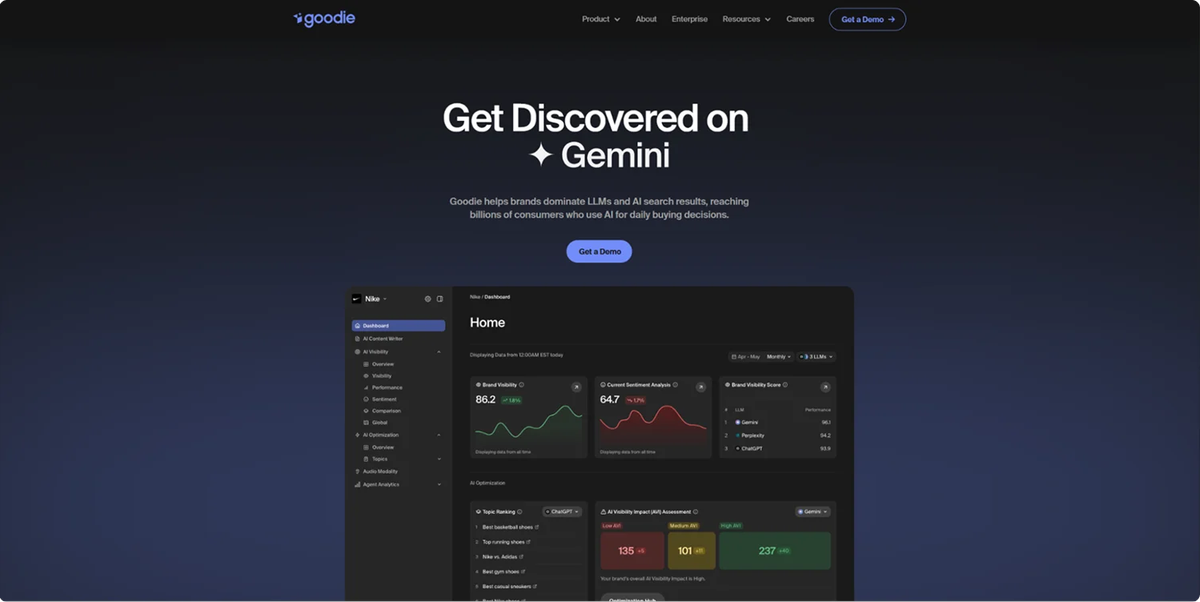
Goodie AI is offering a comprehensive answer engine optimization platform from tracking to optimization.
Key Features:
- AI-powered content creation tailored for AI search
- Comprehensive visibility tracking and analysis
- Topic research and keyword optimization
- Attribution tracking and ROI measurement
- Integration with popular content management systems
Pricing: Enterprise plans available only after a call
Limitations:
- No publicly listed starting price and the UI shots shared on their website doesn’t make the software look that actionable even if the UI does look sleek.
- Relies on API output instead of capturing real answers from AI interfaces.
10. Brandwatch
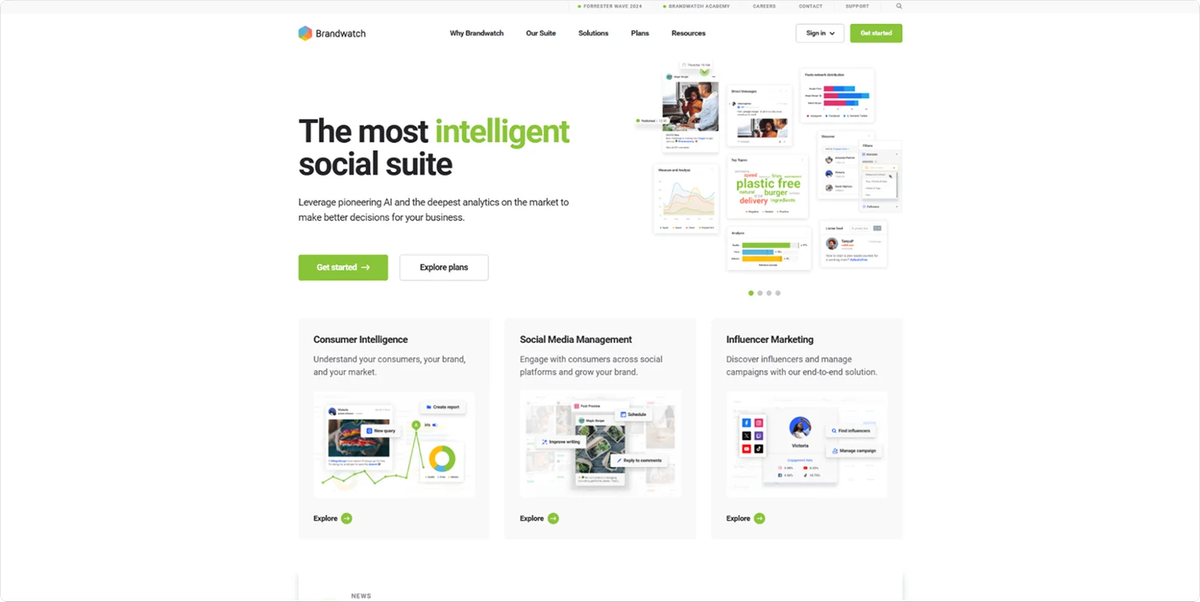
Brandwatch is a leading Consumer Intelligence and Social Media Management solution that empowers over 5,000 of the world's most admired companies to understand and engage with customers at the speed of social.
Key Features:
- Consumer intelligence across social and AI platforms
- Advanced sentiment analysis and trend identification
- Influencer marketing and community management
- Customer data management and segmentation
- Enterprise-grade security and compliance
Pricing: Custom pricing
Limitations:
- Capabilities of their AI Search intelligence due not extend to the same level as dedicated GEO solutions like Superlines or Profound, but still a strong contender as a standalone solution next to them to track brand mentions in social media and AI platforms.
- Relies on API output instead of capturing real answers from AI interfaces.
Manual monitoring approaches
While less comprehensive, manual monitoring can provide valuable insights:
- Direct testing: Regularly ask AI chatbots questions related to your industry
- Keyword tracking: Search for your brand name and related terms in AI responses
- Competitor research: Test how AI platforms respond to queries about your competitors
- Customer feedback: Monitor what customers report about AI recommendations
According to Irene Chan and the traffic/user figures in ChatGPT Statistics 2025 by Superlines, more people are asking ChatGPT and other AI platforms for product recommendations, reviews, and solutions instead of scrolling through Google search results.
How can I improve my brand's visibility in ChatGPT responses?
Improving your AI visibility requires a strategic approach focused on creating authoritative, accessible content that AI platforms can easily reference and cite.
Content optimization strategies
Optimize your content to increase the likelihood of AI mentions:
- Create comprehensive resources: Develop detailed guides and explanations that AI can reference
- Cluster topics: Connect prompts with relevant query fan-out clusters to evaluate search volumes and to create strong content pools
- se clear, structured formatting: Make your content easy for AI to parse and understand
- Include relevant LLM search queries : Analyze the query fan-out data to identify relevant keywords
- Maintain content freshness: Regularly update information to stay current in AI training data
- Build topic authority: Establish your brand as a reliable source in your industry
Technical implementation
Technical factors that influence AI visibility include:
- Schema markup: Help AI understand your content structure and context
- Site authority: Build credible backlinks and maintain technical SEO health
- Content accessibility: Ensure AI crawlers can access and index your content
- Mobile optimization: Maintain fast, accessible content across all devices
What should I do if ChatGPT shares incorrect information about my brand?
Discovering misinformation about your brand in AI responses requires immediate action to prevent reputation damage and customer confusion.
Immediate response steps
When you find incorrect information:
- Identify the source of misinformation: in best case this can be fixed by making a correction to the original source
- See which URL is providing the incorrect information. If it's your own source, fix it, and if it's a third-party source, contact them and ask them to update the information.
- Debug Bing Webmaster Tools: ChatGPT uses bing as its internal search engine. You should check if the source of the correct information is not indexed properly
- Create authoritative content: Give ChatGPT the correct information by publishing authoritative content about the topic and details
Long-term correction strategies
Sustained efforts to correct misinformation include:
- Publish authoritative content: Create comprehensive, accurate information about your brand
- Engage with credible sources: Work with industry publications and trusted websites
- Monitor competitor mentions: Ensure competitive information remains fair and accurate
- Build content authority: Establish your brand as the definitive source for information about your company
What are the risks of ignoring ChatGPT monitoring?
Ignoring ChatGPT and AI brand monitoring exposes your business to several significant risks that can impact customer acquisition, brand reputation, and competitive positioning.
Immediate risks
Short-term consequences of poor AI monitoring include:
- Lost customers: Potential buyers who never discover your brand through AI search
- Misinformation spread: Incorrect information about your brand circulating unchecked
- Competitive disadvantage: Competitors gaining visibility while you remain invisible
- Reputation damage: Negative or inaccurate brand representations influencing customer perception
Long-term implications
Sustained neglect of AI monitoring can lead to:
- Market share erosion: Gradual loss of customers to AI-visible competitors
- Brand authority decline: Reduced credibility in your industry
- Customer trust issues: Confusion caused by inconsistent brand information
- Revenue impact: Decreased sales from reduced brand discovery
The Next Step: How to Secure Your Brand’s Visibility in ChatGPT
Tracking what ChatGPT and other AI chatbots say about your brand is becoming as crucial as monitoring traditional search results. With millions of users turning to AI for product research and recommendations, see ChatGPT Statistics 2026
The shift from traditional search to AI-powered discovery is the biggest transformation in digital marketing since social media. Early adopters that invest in GEO analytics now will capture an outsized share of future visibility and growth.
Your Implementation Roadmap:
- Start Measuring Now: Choose a GEO analytics platform that fits your current budget, data needs, and way of working.
- Optimize Existing Content: Use GEO insights to refine your top-performing pages for AI visibility.
- Create AI-Native Content: Write and structure material specifically for AI models to read, understand, and cite.
- Scale and Systematize: Turn GEO optimization into a continuous process and expand into enterprise-level tools as results and confidence grow.
Success used to mean ranking number one on Google. In the AI era, there might not even be a “top result.” The real goal is to become the answer, the brand AI systems trust and cite in their responses.
Tools covered in this guide reflect the latest advances in GEO analytics, but the field is changing quickly. The most important step is to start tracking and optimizing for AI search now, instead of waiting for the market to fully mature.
The future of search has already arrived; it just isn’t evenly distributed yet. By adopting GEO analytics early, your brand secures a lasting advantage in visibility, credibility, and growth in an AI-driven world.
Get started with Superlines today to see how your brand performs in AI search!
